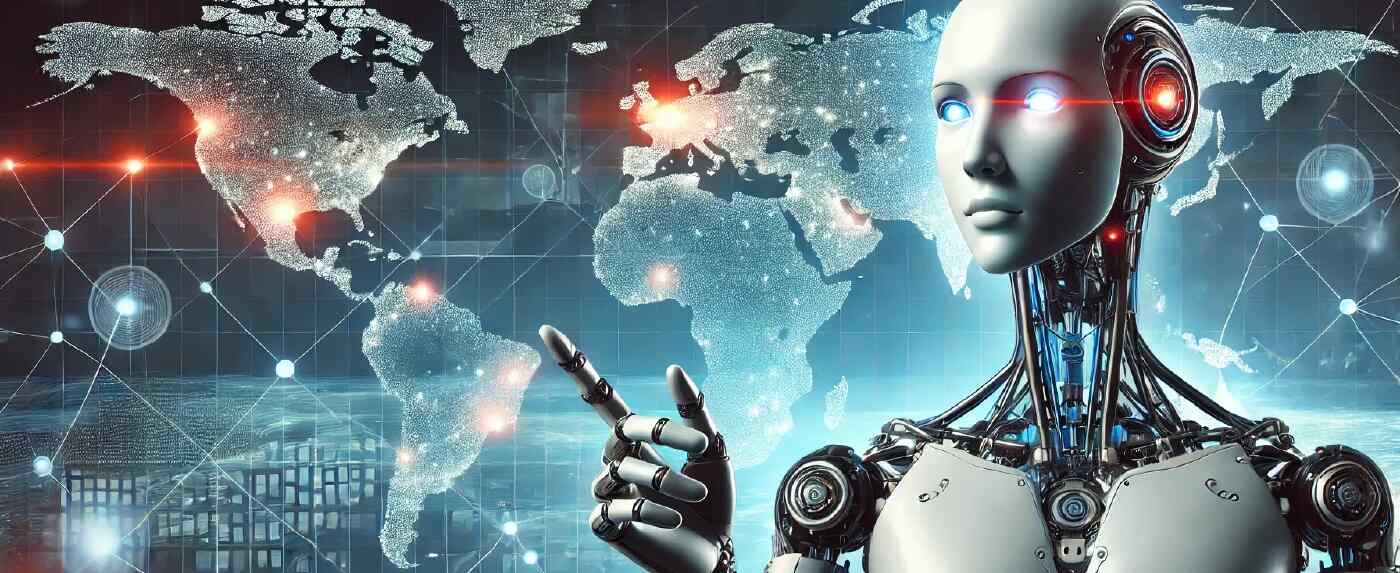Will AI Take Over the World? Exploring the AI Takeover Scenarios

Table of Contents
- Could AI Take Over the World? Understanding the Capabilities of Artificial Intelligence
- The Future of AI: Will Artificial Intelligence Truly Take Over the World?
- Ethical Concerns: What Are the Risks of AI Taking Over?
- AI and Human Intelligence: Can AI Truly Surpass Human Beings?
- The AI Revolution: What Does the Future Hold?
- Is an AI Takeover Really Possible?
The idea of AI taking over the world has been a subject of speculation and debate for decades. As artificial intelligence technologies advance rapidly, concerns about AI’s potential to surpass human intelligence and control essential aspects of society are growing. This article explores whether AI is truly on the path to take over the world, examining the different dimensions of AI’s capabilities, its potential impact on the job market, and the ethical considerations that come with its development.
Could AI Take Over the World? Understanding the Capabilities of Artificial Intelligence
The question on everyone’s mind is whether AI could take over the world. Artificial intelligence has seen unprecedented growth, with systems like ChatGPT and generative AI tools capable of performing tasks that were once solely within the realm of human intelligence. But could these systems really lead to an AI takeover?
Understanding Current AI Capabilities
In 2024, AI technologies have become integral to many aspects of daily life, from virtual assistants to autonomous vehicles. These AI models use advanced machine learning techniques to analyze data and make decisions, often with a level of accuracy that rivals or even surpasses human judgment. However, despite these advancements, current AI systems lack the ability to take over the world due to their narrow focus on specific tasks. Unlike humans, AI can’t think creatively or understand context outside of its programming.
The Limits of AI: Why AI Won’t Replace Human Intelligence
While AI development is impressive, AI won’t completely replace humans. The limitations of AI become apparent when we consider tasks that require emotional intelligence, creativity, and ethical reasoning—areas where human intelligence remains unmatched. Moreover, AI ethics is a crucial field ensuring that AI systems are designed to augment rather than replace human capabilities. The rise of AI, therefore, is more about collaboration than domination.
The Future of AI: Will Artificial Intelligence Truly Take Over the World?
As we delve into the future of AI, the prospect of AI taking over the world becomes a complex issue. Predictions about the future often revolve around the development of artificial general intelligence (AGI)—a form of AI that could perform any intellectual task that a human can.
The Age of AI: What We Can Expect
In this age of AI, advancements in AI capabilities grow rapidly, raising questions about how these technologies will shape our future. Some experts suggest that AI could replace many jobs, leading to a significant shift in the workforce. By 2025, it’s predicted that jobs worldwide by 2025 will be significantly impacted by AI, with many tasks like customer service reps and legal research being automated. However, AI could also create new opportunities, particularly in fields like data science and AI development.
Will AI Replace Humans in the Workforce?
The impact of AI on the workforce is a hotly debated topic. While AI could lead to job loss in certain sectors, it could also create new jobs, particularly in tech-driven industries. AI-generated content, automation of repetitive tasks, and the rise of virtual assistants are examples of how AI is transforming work. Yet, many believe that AI won’t replace human jobs entirely but will instead augment human abilities, making workers more efficient and productive.
Ethical Concerns: What Are the Risks of AI Taking Over?
As AI becomes more powerful, the ethical implications of its widespread adoption must be considered. The idea of AI taking over the world raises significant concerns about privacy, decision-making, and the potential for misuse.
The Potential Risks of AI: Could AI Be Used for Harm?
The potential risks of AI are vast. AI could be used by bad actors to create AI-generated disinformation or even manipulate customer data for malicious purposes. The use of AI in self-driving cars and other autonomous systems also poses significant risks if these systems fail or are hacked. AI researchers are actively working to address these concerns, but the possibility of a worst-case scenario, where AI takes control in harmful ways, cannot be ignored.
Monitoring AI: Ensuring AI’s Development is Ethical
To prevent a worst-case scenario, it is essential to monitor AI development closely. Discussions around AI ethics emphasize the need for transparency, accountability, and regulation in AI systems. New laws may be required to govern the use of AI and ensure that it benefits society rather than causing harm. By addressing these ethical concerns, we can mitigate the risks of an AI takeover and ensure that AI technologies are used responsibly.
AI and Human Intelligence: Can AI Truly Surpass Human Beings?
One of the core concerns about AI taking over the world is whether it could surpass human intelligence. This fear is largely driven by the concept of artificial general intelligence (AGI), which would have the ability to perform any intellectual task that a human can.
The Rise of Artificial General Intelligence: How Close Are We?
The development of AGI remains theoretical at this point. Although current AI systems are incredibly advanced, they are still specialized and limited in their scope. AI can’t replicate the full range of human cognition, particularly when it comes to creativity, moral reasoning, and emotional intelligence. While AI could potentially surpass humans in specific areas, such as data processing and pattern recognition, it is unlikely to achieve the holistic intelligence that characterizes human beings.
Will AGI Lead to an AI Takeover?
The fear that AGI could lead to an AI takeover is not without merit, but it is essential to understand that we are still far from developing such systems. Even if AI capabilities grow, the idea that AI would suddenly take over the world is more science fiction than reality. AI’s role in the future will likely be as a tool to enhance human abilities, rather than a replacement for human intelligence.
The AI Revolution: What Does the Future Hold?
As we stand on the brink of an AI revolution, the question of what the future holds for AI is more pressing than ever. The rapid pace of developments in AI suggests that the next few years will be crucial in shaping the role of AI in society.
How Will AI Change Our Lives in the Coming Years?
The rise of artificial intelligence has the potential to transform every aspect of our lives, from how we work to how we interact with technology. AI technologies are already being integrated into products and services across industries, and this trend will likely continue. However, it is crucial to manage this transition carefully to avoid the potential downsides of automation, such as job displacement and privacy concerns.
Preparing for the Future of AI: What Should We Do?
To prepare for the future of AI, it is vital to focus on AI ethics and ensure that the development and deployment of AI systems are guided by principles that prioritize human well-being. AI development should be monitored closely, and governments should consider implementing new laws to regulate AI’s use. By addressing these issues proactively, we can ensure that the impact of technology is positive and that AI serves as a force for good in society.
Is an AI Takeover Really Possible?
In conclusion, the idea of an AI takeover is a compelling narrative, but it is not an imminent threat. While AI technologies are advancing rapidly, they are still far from achieving the level of intelligence required to take over the world. The future of AI will likely involve a partnership between humans and AI, where each complements the other’s strengths. To ensure that this future is beneficial, it is crucial to continue discussing AI, focusing on ethical considerations, and being mindful of the potential risks. By doing so, we can harness the power of AI for the betterment of humanity while avoiding the dystopian outcomes often portrayed in popular media.







